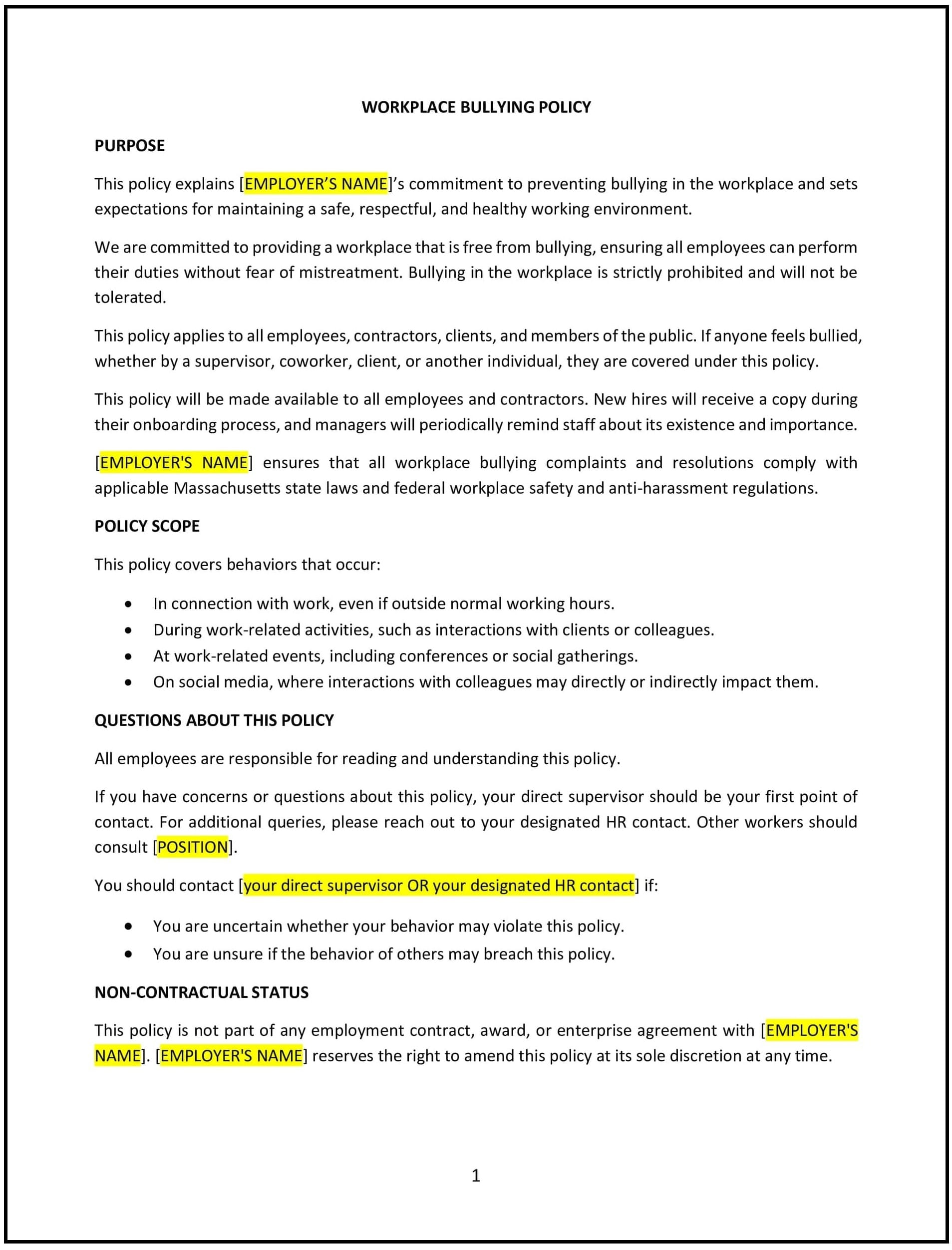Workplace bullying policy (Massachusetts): Free template
Got contracts to review? While you're here for policies, let Cobrief make contract review effortless—start your free review now.

Customize this template for free
This workplace bullying policy is designed to help Massachusetts businesses prevent and address bullying behavior in the workplace. The policy defines workplace bullying, outlines the company’s zero-tolerance stance, and provides a clear process for reporting, investigating, and resolving bullying incidents. It also emphasizes the importance of fostering a respectful, inclusive, and safe work environment where all employees are treated with dignity and respect.
By adopting this policy, businesses can reduce the risk of bullying in the workplace, improve employee well-being, and ensure a positive, productive work environment.
How to use this workplace bullying policy (Massachusetts)
- Define workplace bullying: Clearly define what constitutes workplace bullying under the policy. This includes both direct and indirect bullying behaviors, such as verbal abuse, physical intimidation, exclusion, or spreading malicious rumors. The policy should specify that bullying can occur between colleagues, supervisors, and subordinates.
- Set expectations for behavior: Establish clear expectations for professional behavior in the workplace. Employees should be aware that any form of bullying, harassment, or discrimination is not acceptable and will not be tolerated.
- Provide a reporting process: Employees should know how to report incidents of bullying in a safe, confidential manner. The policy should include multiple reporting options, such as submitting a report to HR, a designated employee, or via an anonymous hotline. The policy should also outline the steps employees can take if they feel that their complaint has not been addressed.
- Outline the investigation process: The policy should specify how reports of bullying will be investigated. This includes the timeline for investigating complaints, the role of HR or management in the investigation, and how the company ensures that investigations are conducted fairly and impartially.
- Define the consequences for bullying: Outline the potential disciplinary actions for employees found to be engaging in bullying behavior. This can range from warnings and counseling to termination, depending on the severity of the incident. The policy should emphasize that consequences will be consistent and applied fairly.
- Provide support for victims: Include provisions for providing support to employees who have been victims of bullying. This may include counseling services, access to Employee Assistance Programs (EAPs), or other resources designed to help employees cope with the emotional and psychological effects of bullying.
- Ensure compliance with Massachusetts and federal laws: Ensure that the policy complies with Massachusetts state laws and federal regulations, including those related to workplace discrimination, harassment, and equal treatment under the law.
- Review and update regularly: Periodically review and update the policy to ensure it is compliant with Massachusetts state laws, federal regulations, and any changes in the company’s operations or approach to workplace culture.
Benefits of using this workplace bullying policy (Massachusetts)
This policy offers several benefits for Massachusetts businesses:
- Creates a respectful workplace: The policy helps businesses establish and maintain a workplace where all employees are treated with respect and dignity, reducing the risk of bullying behavior.
- Reduces legal risks: By proactively addressing workplace bullying, businesses can reduce the risk of legal claims related to harassment, discrimination, and hostile work environments.
- Improves employee well-being: Employees who feel safe and supported in their work environment are more likely to experience higher levels of job satisfaction and mental well-being.
- Increases productivity: A bullying-free workplace fosters a more focused, engaged, and collaborative workforce, leading to improved productivity and performance.
- Enhances employee retention: When employees feel safe and valued, they are more likely to stay with the company long-term, which can reduce turnover and associated recruitment costs.
- Strengthens organizational culture: A clear commitment to preventing and addressing bullying helps build a positive organizational culture that encourages cooperation, teamwork, and mutual respect.
- Promotes legal compliance: The policy helps businesses comply with Massachusetts state laws and federal regulations regarding workplace harassment and discrimination, reducing the risk of legal violations.
Tips for using this workplace bullying policy (Massachusetts)
- Communicate the policy clearly: Ensure that all employees are aware of the workplace bullying policy and understand the company’s zero-tolerance stance on bullying. Include the policy in the employee handbook and review it during onboarding or team meetings.
- Provide training on preventing bullying: Offer training sessions to employees and management on recognizing, preventing, and addressing bullying behavior. The training should focus on creating a respectful work environment and providing employees with tools to address conflicts constructively.
- Foster an open-door policy: Encourage open communication between employees and management regarding any concerns about bullying. Employees should feel comfortable speaking up without fear of retaliation.
- Enforce the policy consistently: The policy should be enforced fairly and consistently across all levels of the organization. Ensure that all complaints are taken seriously and that investigations are conducted thoroughly and impartially.
- Offer support to victims: Provide access to support services such as counseling, EAPs, or other mental health resources to help employees cope with the effects of bullying.
- Review and update regularly: Periodically review the policy to ensure it is compliant with Massachusetts state laws, federal regulations, and any changes in the company’s operations or workplace culture. Update the policy as needed to ensure it continues to promote a safe and respectful environment.